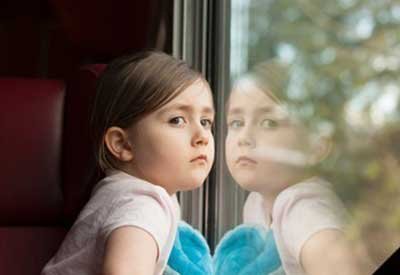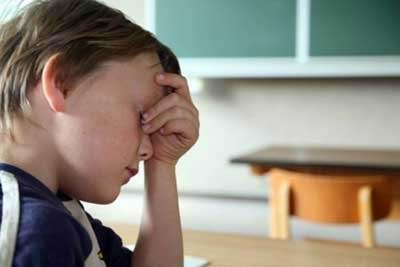The treatment of depression in childhood leads to mental health in adulthood

Many people think of depression as adult illness, while its severity among children is much higher than that of adults, and neglecting it can have adverse effects such as mood disorders in adulthood.
Although in the light of the efforts of academic and academic centers, attention has grown to include mental illness, it has not yet been taken into account in this type of illness or is not sufficiently institutionalized.
Specialists and experts in the field of mental health in recent years have paid special attention to depression and childhood mental illness, and in addition to publishing numerous scientific articles, they have held various seminars on this issue.
The West Azarbaijan University of Medical Sciences and Health Services, as a policeman of the province, has taken a lot of action in this regard. And in addition to culture-building, in order to prevent this, many specialists have also trained in the field of treatment of mental illnesses, including depression. Is.
Depression is a major disorder in childhood, which, if not timely treated and treated, can lead to mood disorders, according to the Mental Health Officer (Department of Health Affairs).
The children added, with their little problems and ill-treatment of their parents and their relatives, and the effects of clinical depression and its behavioral problems.
He stated that depression in many cases results from a combination of genetic and environmental factors, and in some cases its origin is not clear.
He emphasized that some children have genetic origins in depression and said: "Several severe depression attacks are relatively short but may persist for many years.
He stated that children in most cases suffer from depression, such as losing one parent, separating their parents or their severe illness (cancer, diabetes, etc.), in addition to those who have been sexually abused They are also at increased risk of developing depression.
The psychologist said: In some cases, unprovoked children also experience a period of depression or several periods that are normal in their intervals.
He added that a period of depression lasts from 6 to 9 months, and children who once suffer from depression are at risk of other attacks within five years.
According to the National Union of Mental Illnesses in the United States, these children are five times more likely to develop acute depression in adolescents than those who have not been depressed.
He added: In some cases, a child's depression develops before it appears many years later, and in others, children may have persistent depression that requires treatment until adulthood.
Heidari, a neurologist, also told the reporter in this regard: The developmental process of children is full of challenges and opportunities, and school lessons and friendship, friendship and companionship, maturity and exam and changes in puberty in some children are more likely to happen. falls down.
He said: "Some kids can cope well with these changes, but others can not, and the inability to cope with such changes can cause stress and even depression."

The nerve specialist added that symptoms of depression in children are somewhat different from that of the elderly, for example, the sadness we see in the elderly in young children, mischief, unreasonable and lengthy harassment, long cries, and without reason, with Anger and irritability are difficult to calm down.
According to him, aggression, nocturia, chewing nails, sleep disturbances, hyperactivity, lack of attention, indifference, energy degradation, delinquency, anorexia and weight loss, academic failure, learning disabilities, isolation, trance and school absconding Includes symptoms of depression in children.
He added: Insomnia, or daily snoring, slow motion, decreased concentration, feelings of worthlessness or sin, and repeated thoughts of death such as "I wish I had not been born", or that "I wish I'd be dead" is another sign of a child's offspring.
He added: Sometimes accompanied by these symptoms, anxiety symptoms can also be seen in children; symptoms such as extreme concerns about your or your family's health, anxiety when you are separated from your parents, or your parents' high dependence, fear of darkness And loneliness and other fears.
The university professor advised parents to see if they have symptoms of depression in the child for further evaluation and treatment to comprehensive health centers or psychiatrists or psychiatrists of children and adolescents or other mental health professionals.
Heidari continued: Treatment for depression in children usually involves psychotherapy, drug therapy, or a combination of these two methods.
He added: "Psychotherapy may be done individually or in family, and antidepressants are also used for therapeutic treatment.
** The need for dialogue with children
Neuroscientist Mohammad Reza Heidari said: Encourage the child to sleep, exercise, eat, and spend time with her and spend time talking with her.
He added: Talk to him about things that happen to him at home, at school, or elsewhere, and try to find out what has hurt him, and Ask him to paint for you.
"Participating in parenting and parenting skills classes can be effective in preventing or managing childhood depression," he said.
The depressive disorder is not specific to adults and is also seen in children and adolescents, but its symptoms are different from the symptoms of depression in adults.
Wish Kayani, emphasizing that the most common age in the child and adolescent cortex for the disease is 19 to 20 years, continued: loss of performance, academic failure, disruptions in friendship, aggression, excuses, behavioral differences, Dropping energy, isolating and cornering, irritability, and sometimes anxiety are a warning sign of depression in children and adolescents.
He added that the result of depression in teenagers is self-mutilation, suicide, disappointment, and guilty feelings that are very dangerous.
My mother, a mother of a depressed child who also treated her child to a psychiatrist, said in a conversation: Initially, insomnia, a discomfort with my friends and the impatience of my child were a sign of Samira's dislike. I knew, but later, with the help of a consultant in a telegram channel, I became acquainted with the subject of psychotherapy for children and brought it to the doctor.
He added: "Since the last six months I brought my child to my doctor, he has been shown signs of healing, and many of his improper mood have improved, especially in the face of his age.
He expressed the hope that many parents who have children with depression, attending to a doctor and practicing counseling by physicians would solve the problem on time.
The mother of Orumieh emphasized: "The most important reason for my child's depression was to my parents and his older sister's disregard for her, which in the past weeks has given this neglect attention to intelligence," the mother said.
According to experts, parenting and intelligent attention to children, along with preventing their reluctance to collective activities and receiving medical advice when needed, can be helpful in reducing childhood depression.
Congratulations @milimp! You have completed the following achievement on the Steem blockchain and have been rewarded with new badge(s) :
Click here to view your Board
If you no longer want to receive notifications, reply to this comment with the word
STOPDo not miss the last post from @steemitboard: